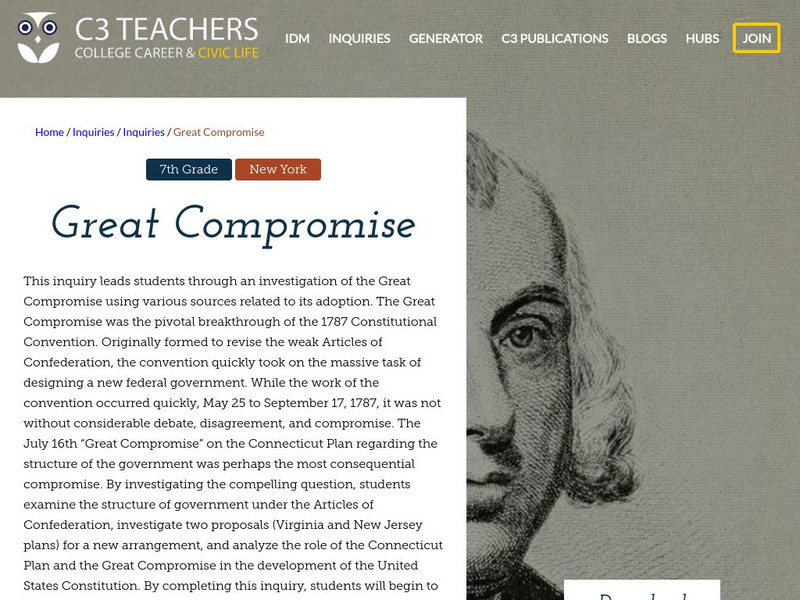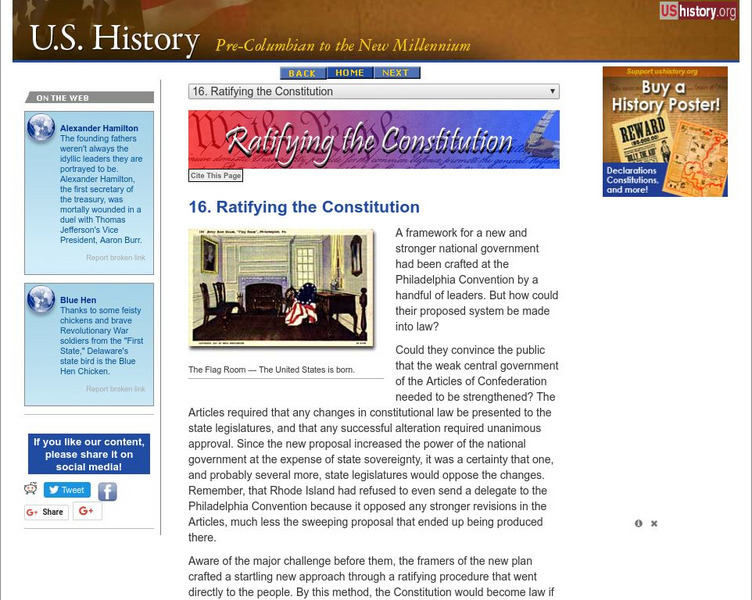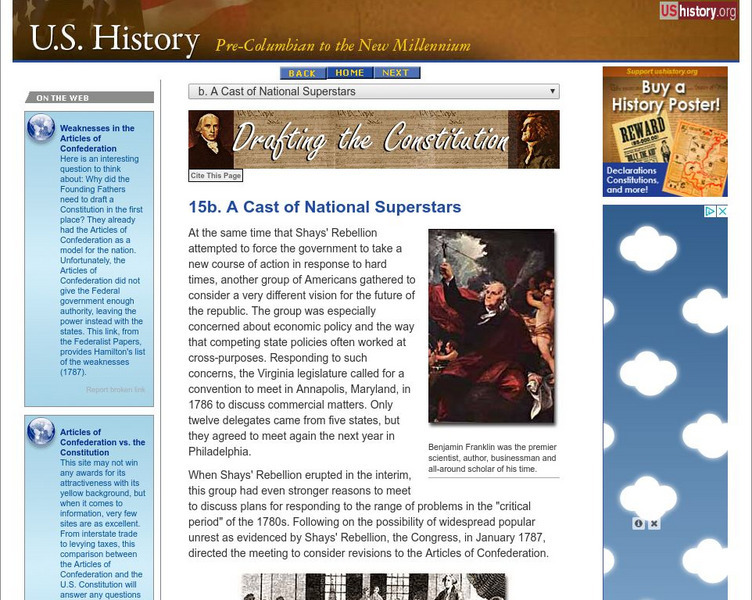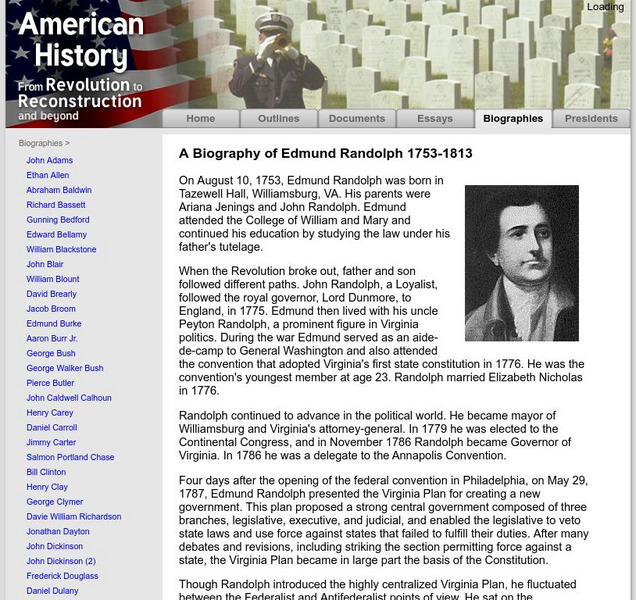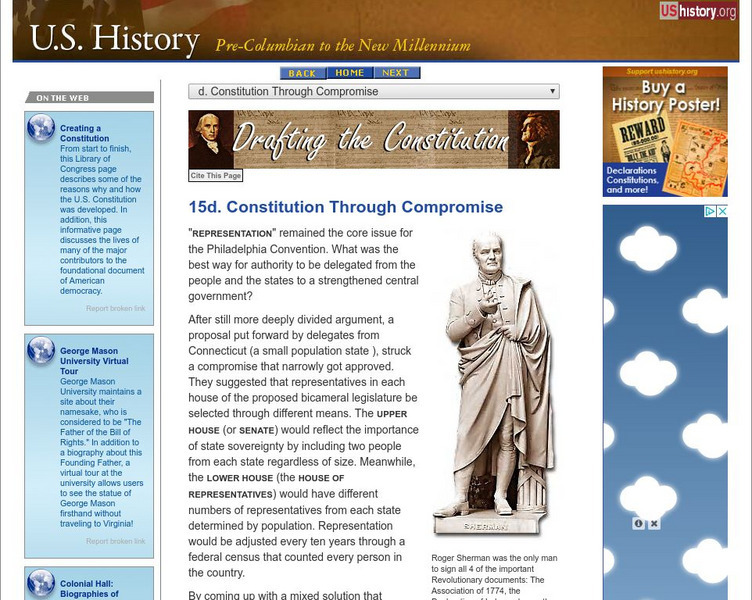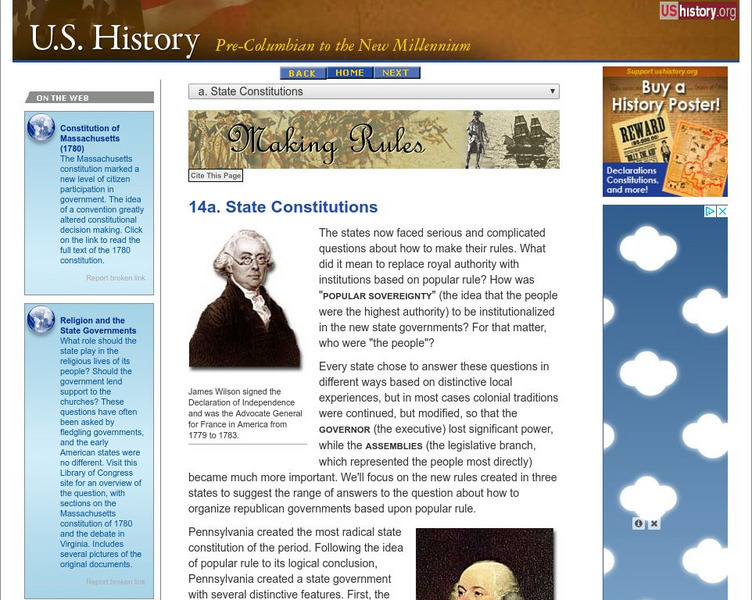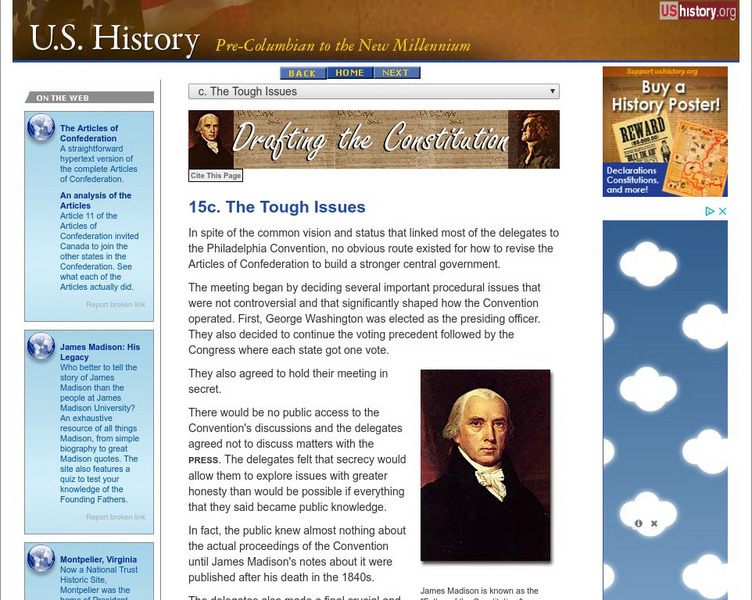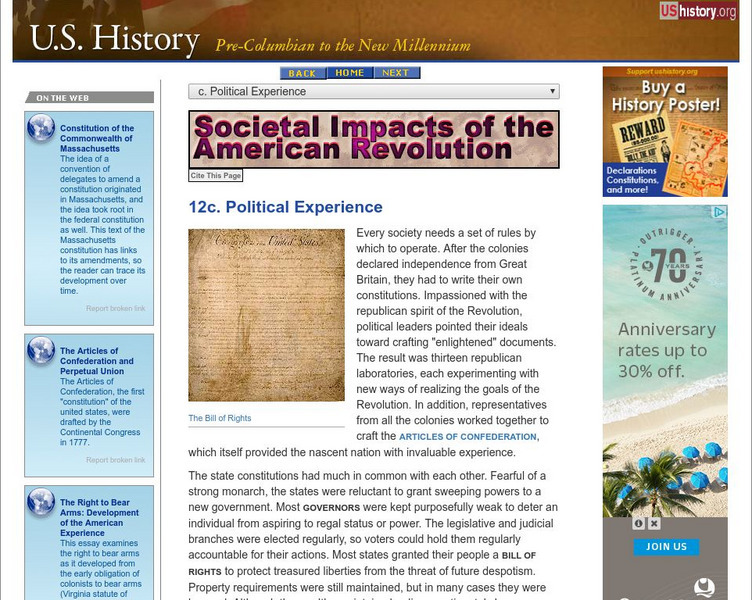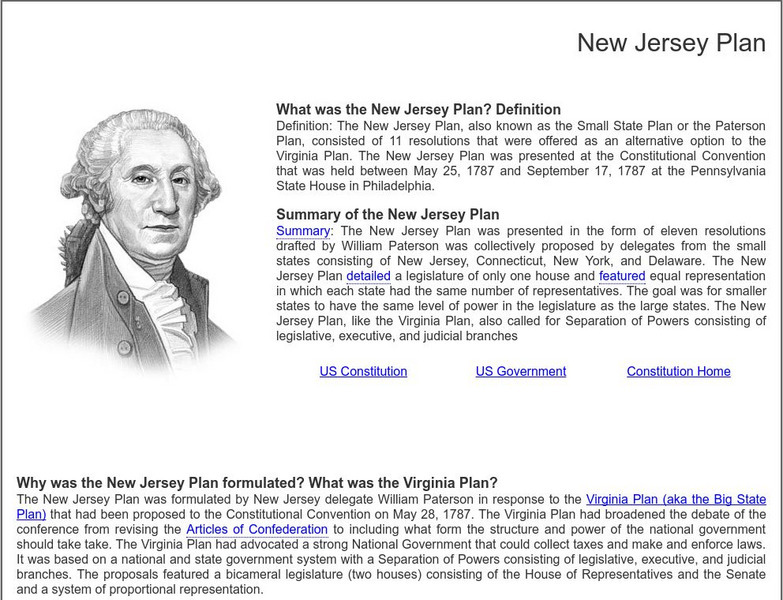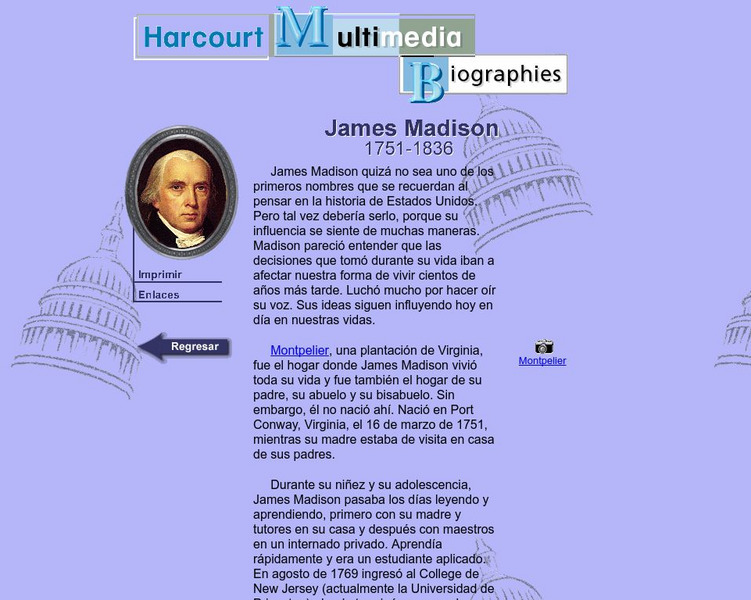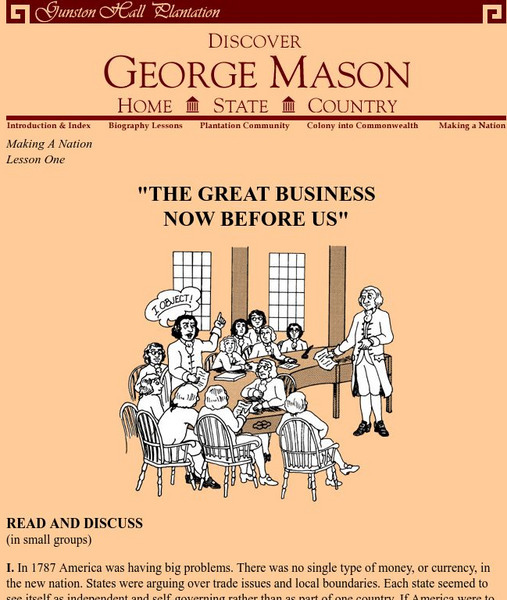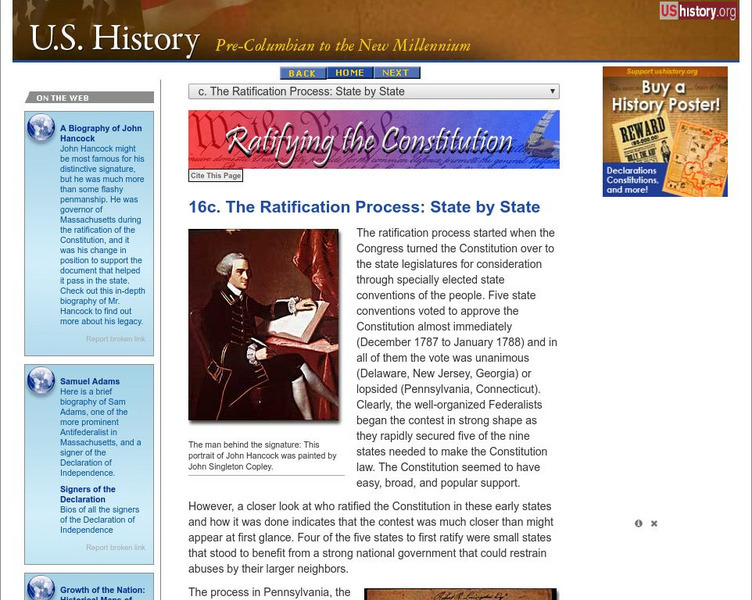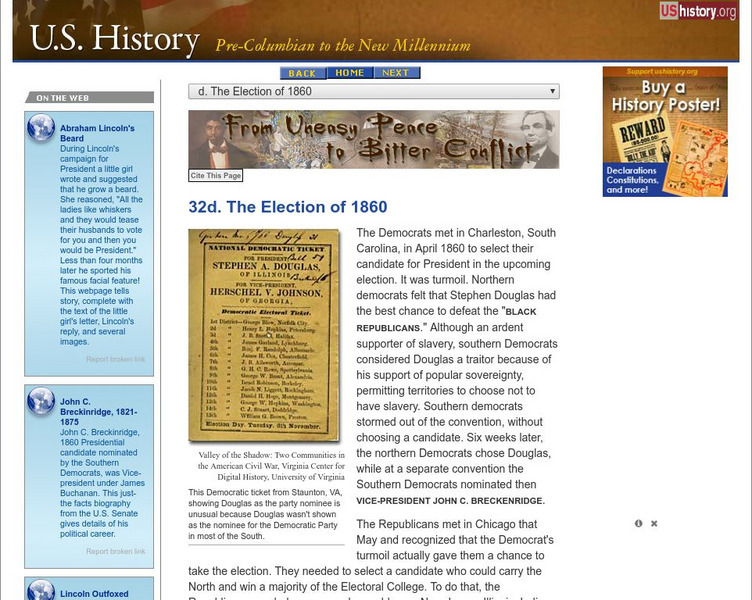C3 Teachers
C3 Teachers: Inquiries: Great Compromise
A learning module on the Great Compromise and the role it played in developing the US Constitution in 1787. It includes several supporting questions accompanied by formative tasks and source materials, followed by a summative performance...
Independence Hall Association
U.s. History: Ratifying the Constitution
The delegates to the Constititional Convention produced a new governing document for the new United States. Read about how they determined to take the ratification process to the people of the states.
Khan Academy
Khan Academy: Us History: 1754 1800: Unit Test
Take this eleven question unit test over US history during the period of 1754 and 1800.
Library of Congress
Loc: The Constitution: Drafting a More Perfect Union
This lesson plan provides discussion, culminating, and extension activities to enhance student understanding of the Constitution, and the Committees of Detail and Style. Students have the opportunity to compare the work of those two...
US Government Publishing Office
Ben's Guide to u.s. Government: Signers of the Constitution Word Search
A printable wordsearch on thirty-nine of the delegates who signed of the US Constitution.
Independence Hall Association
U.s. History: A Cast of National Superstars
A brief look at some of those who served as delegates to the Philadelphia Convention, which morphed into a constitutional convention. Pay attention to the class of people who made up the delegates.
University of Groningen
American History: Biographies: Edmund Randolph 1753 1813
This site from the University of Groningen profiles Edmund Randolph and chronicles his role as Attorney General of the US. Also includes his role as the presenter of the Virginia Plan to the Constitutional Convention.
Curated OER
National Park Service: Resource Study: Charles Pinckney National Historic Site [Pdf]
A scholarly publication which examines the archaeological findings of Snee Farm, the plantation and house owned by Charles Pinckney, a delegate to the Constitutional Convention from South Carolina. Click on "Table of Contents" to get a...
Independence Hall Association
U.s. History: Constitution Through Compromise
Read about how compromises were reached at the Philadelphia convention that dealt with issues between large and small states, and slave and free states. Take the quick quiz to assess knowledge about the writing of the Constitution.
Independence Hall Association
U.s. History: State Constitutions
The new states did a great deal of experimentation within the bounds of the new republican ideals. Read about three very different takes on how a state should be organized governmentally.
Khan Academy
Khan Academy: Ap Us History Period 3: 1754 1800: The American Revolution
This Khan Academy resource provides video lessons, detailed notes, and practice questions for the AP U.S. History Exam. The years 1754-1800 are covered.
iCivics
I Civics: The Federalist Debate
The ratification debate between the Federalists and Anti-Federalists gives us insight into the ideas behind both sides and a better understanding of how our government developed in its early years.
PBS
Pbs: American Experience: Alexander Hamilton
One of our original Founding Fathers, Alexander Hamilton was a controversial figure. This PBS site allows you to watch excerpts from a two-hour long documentary on his life and role in US history. Provides a detailed timeline that gives...
Independence Hall Association
U.s. History: The Tough Issues
Read about the change of plans when delegates to the Philadelphia convention decided to write a new constitution to replace the Articles of Convention. See the ideas delegates had to address concerns of large and small states.
Independence Hall Association
U.s. History: Political Experience
Read about how the state governments in the new American nation served as the laboratory to try out new ideas of governing and treating citizens. See how remarkably similar the ideas put forth in state constitutions were to each other.
Siteseen
Siteseen: Government and Constitution: New Jersey Plan
New Jersey Plan was presented in the form of eleven resolutions drafted by William Paterson. It detailed a legislature of only one house and featured equal representation in which each state had the same number of representatives thus...
Siteseen
Siteseen: Government and Constitution: Virginia Plan
Learn about the Virginia Plan that was based on a national and state government system with a separation of powers consisting of legislative, executive, and judicial branches. It also contained a resolution for proportional...
Houghton Mifflin Harcourt
Harcourt: Biographies: James Madison
A brief biography of James Madison. Find out why James Madison was called the father of the constitution. Learn how his life affected the United States. (In Spanish)
Other
Gunston Hall Plantation: "The Great Business Now Before Us"
In 1787, America was having big problems. There was no single type of money, or currency, in the new nation. States were arguing over trade issues and local boundaries. Each state seemed to see itself as independent and self-governing...
Khan Academy
Khan Academy: Challenges of the Articles of Confederation
This resource from Khan Academy provides a study resource about the weaknesses of the Articles of Confederation, Shay's Rebellion, and the needed call for a new Constitution. These questions are intended for students taking high school...
Independence Hall Association
U.s. History: Women's Suffrage at Last
Trace the history of the women's suffrage movement from its organized beginnings in 1848 with the Seneca Falls Convention to the final success with the adoption of the 19th Amendment, which constitutionally granted women the right vote.
Independence Hall Association
U.s. History: The Ratification Process: State by State
The ratification of the Constitution was placed at the hands of the state legislatures. Read about which states supported the ratification, which were opposed, and why. Find out why, even after the requisite number of states had voted...
Independence Hall Association
U.s. History: The Election of 1860
The election of Abraham Lincoln in 1860 was a watershed moment for the union of the country. Read about the political conventions, several candidates, and the votes that were split among them. Find a map that shows how the electoral...
Independence Hall Association
U.s. History: George Washington: The First Administration
Read about George Washington's presidency. See why his role was so important in setting precedents to be followed by future chief executives. Find out about some of the warts in his personality too, all of which made him more human.


